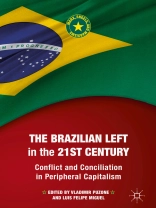This book aims to reconstruct the role played by left movements and organizations in Brazil from their process of renewal in the 1980s as they fought against the civil-military dictatorship, going through the Workers’ Party’s governments in the 2000s, until the Party’s dramatic defeat with a parliamentary coup in 2016. Henceforth, there have been attacks on social and political rights that severely affect the lower classes and reverted progressive policies on various issues. Through a historical reconstruction, this book analyzes how different left movements and organizations contributed to the democratization of Brazilian society, and how their contradictions contributed to the actual conservative turn. The essays also focus the development of Brazilian Left in the light of socialist politics and especially Marxism, both in terms of political organizations and theory. In this sense, the essays in this collection represent an effort to rethink some aspects of the history of the Brazilian left and how it can reorganize itself after the conservative turn.
Tabela de Conteúdo
1. Introduction.- 2. the Development of the Workers’ Party: The Rise and Fall of a Star.- 3. from the Rooseveltian Dream to the Nightmare of Parliamentary Coup.- 4. the Choices of the Left: The Paradox of the New Developmentalist State.- 5. Democracy and the Left in Contemporary Brazil.- 6. Labor Movement in Brazil: Challenges and Opportunities for a Left-Wing Labor Politics.- 7. Feminism and Democracy in Brazil.- 8. the Workers’ Party and the Racial Agenda in Twenty-First Century Brazil: The Need for a New Project of the Left Against Racial Inequality.- 9. the Lgbt Movement, the Brazilian Left, and the Process of Democratization.- 10. Indigenous Peoples, Traditional Communities and the Environment.- 11. June 2013, Five Years Later: Polarization, Reconfiguration of Activism and Challenges for the Brazilian Left.- 12. Post-Democracy and Neoliberalism in Contemporary Latin America: The Rise of the Left Turns and the Brazilian Democratic Failure.
Sobre o autor
Luis Felipe Miguel, Full Professor in the Political Science Institute at the University of Brasília, Brazil, where he leads the Research Group on Democracy and Inequalities.
Vladimir Puzone is Research Professor in the Sociology Department at the University of Brasília, Brazil. He is the author of the book Capitalismo perene: reflexões sobre a estabilização do capitalismo a partir de Lukács e da teoria crítica (Perennial capitalism: reflections on the stabilization of capitalism in Lukács and Critical Theory, 2016).












